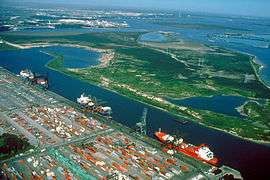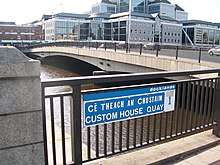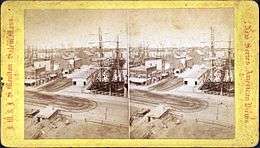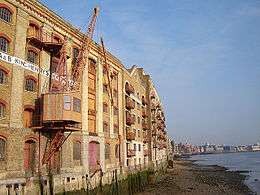Wharf
A wharf, quay (/kiː/, also /keɪ, kweɪ/[1]), or staith(e) is a structure on the shore of a harbour or on the bank of a river or canal where ships may dock to load and unload cargo or passengers.[2][3] Such a structure includes one or more berths (mooring locations), and may also include piers, warehouses, or other facilities necessary for handling the ships. Wharves are often considered to be a series of docks at which boats are stationed.

Overview
_Muelle%2C_se%C3%B1al_de_tr%C3%A1fico_de_peligro.png)
A wharf commonly comprises a fixed platform, often on pilings. Commercial ports may have warehouses that serve as interim storage: where it is sufficient a single wharf with a single berth constructed along the land adjacent to the water is normally used; where there is a need for more capacity multiple wharves, or perhaps a single large wharf with multiple berths, will instead be constructed, sometimes projecting over the water. A pier, raised over the water rather than within it, is commonly used for cases where the weight or volume of cargos will be low.
Smaller and more modern wharves are sometimes built on flotation devices (pontoons) to keep them at the same level as the ship, even during changing tides.
In everyday parlance the term quay is common in the United Kingdom, Canada, Australia, and many other Commonwealth countries, and the Republic of Ireland, whereas the term wharf is more common in the United States. In some contexts wharf and quay may be used to mean pier, berth, or jetty.[4]
In old ports such as London (which once had around 1700 wharves[5]) many old wharves have been converted to residential or office use.
Certain early railways in England referred to goods loading points as "wharves". The term was carried over from marine usage. The person who was resident in charge of the wharf was referred to as a "wharfinger".[6]
Etymology

One explanation is that the word wharf comes from the Old English warft or the Old Dutch word werf, which both evolved to mean "yard", an outdoor place where work is done, like a shipyard (Dutch: scheepswerf) or a lumberyard (Dutch: houtwerf). Originally, werf or werva in Old Dutch (werf, wer in Old Frisian) simply referred to inhabited ground that was not yet built on (similar to "yard" in modern English), or alternatively to a terp.[7] This could explain the name Ministry Wharf located at Saunderton, just outside High Wycombe, which is nowhere near any body of water. In support of this explanation is the fact that many places in England with "wharf" in their names are in areas with a high Dutch influence, for example the Norfolk broads.
In the northeast and east of England the term staith or staithe (from the Norse for landing stage) is also used. The two terms have historically had a geographical distinction: those to the north in the Kingdom of Northumbria used the Old English spelling staith, southern sites of the Danelaw took the Danish spelling staithe. Both originally referred to jetties or wharves. In time, the northern coalfields of Northumbria developed coal staiths specifically for loading coal onto ships and these would adopt the staith spelling as a distinction from simple wharves: for example, Dunston Staiths in Gateshead and Brancaster Staithe in Norfolk. However, the term staith may also be used to refer only to loading chutes or ramps used for bulk commodities like coal in loading ships and barges.
Quay, on the other hand, has its origin in the Proto-Celtic language. Before it changed to its current form under influence of the modern French quai, its Middle English spelling was key, keye or caye. This in turn also came from the Old Norman cai (Old French chai), both roughly meaning "sand bank". The Old French term came from Gaulish caium, ultimately tracing back to the Proto-Celtic *kagio- "to encompass, enclose". Modern cognates include Welsh cae "fence, hedge" and Cornish ke "hedge", [8] and the Dutch kade.
Gallery
 Stereoscopic view of Long Wharf in Boston, United States, c. 19th century, jutting into Boston Harbor
Stereoscopic view of Long Wharf in Boston, United States, c. 19th century, jutting into Boston Harbor- Modern view of Boston's Long Wharf (2006)
 King Henry's Wharves, typical London wharves converted to apartments
King Henry's Wharves, typical London wharves converted to apartments Wharf by Marriott/Pacquereau Bay on St. Thomas
Wharf by Marriott/Pacquereau Bay on St. Thomas_arp.jpg)
References
- "quay". Merriam-Webster Dictionary. Merriam-Webster, Incorporated. 31 August 2012. Retrieved 19 October 2012.
- "quay". American Heritage Dictionary. Dictionary.com, LLC. Retrieved 8 February 2010.
- "wharf". American Heritage Dictionary. Dictionary.com, LLC. Retrieved 8 February 2010.
- wharf. Roget's 21st Century Thesaurus, Third Edition. Philip Lief Group. 2013.
- Craig, Charles; Diprose, Graham; Seaborne, Mike (2009). London's Changing Riverscape. London: Frances Lincoln Ltd. ISBN 978-0-7112-2941-9.
- Mitchell, Vic; Smith, Keith (1996). Branch Lines Around Bodmin. Midhurst, West Sussex: Middleton Press. ISBN 978-1873793831.
- "werf, werva". Historische woordenboeken, Nederlands en Fries (in Dutch). Instituut voor de Nederlandse Taal. Retrieved 8 February 2020.
- Harper, Douglas. "quay (n.)". Online Etymology Dictionary. Retrieved 8 February 2020.
External links
| Wikimedia Commons has media related to Wharves and quays. |